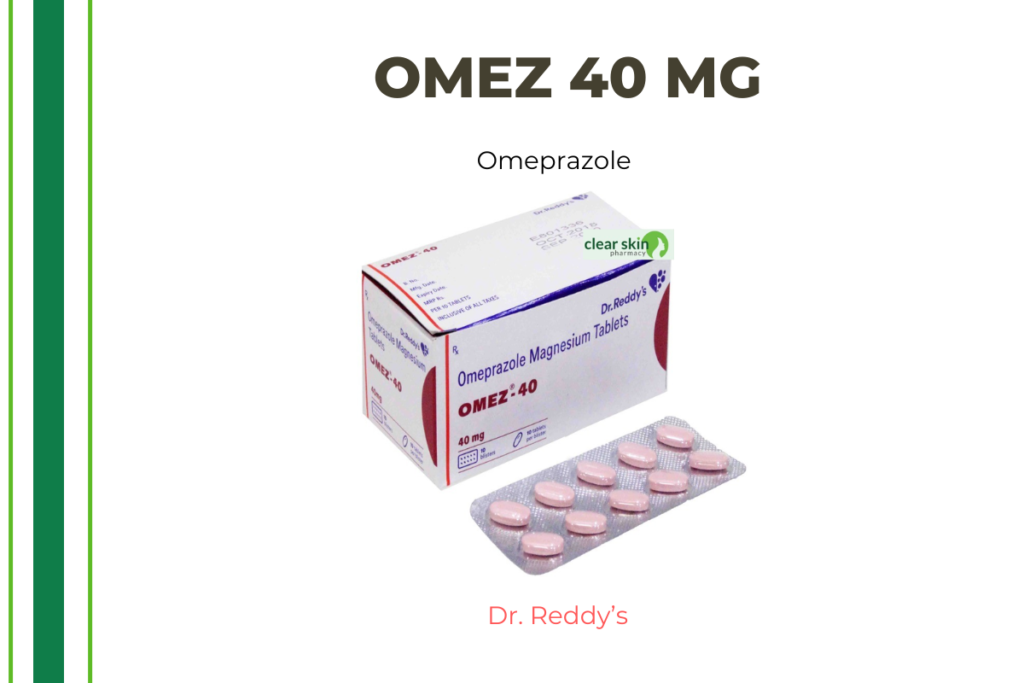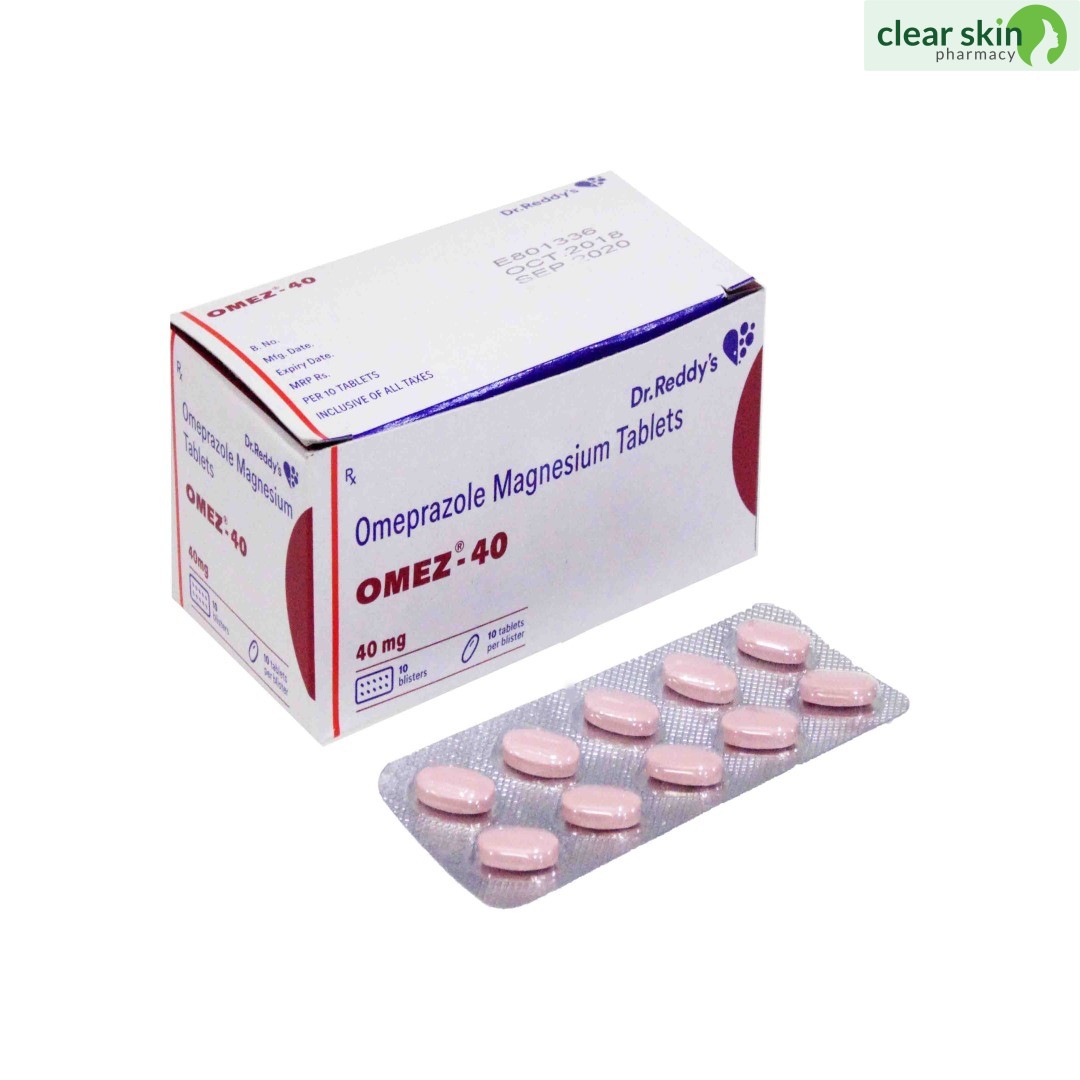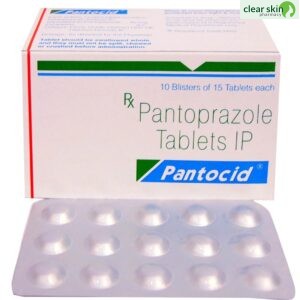Omez 40 mg
Omez 40 mg belongs to the Proton Pump Inhibitor (PPI) class of medications, which decrease the quantity of stomach acid generated. It is used to treat gastroesophageal reflux disease, stomach ulcers, and Zollinger Ellison syndrome (overproduction of acid due to pancreatic tumor).
Omez 40 mg helps to lower stomach acid by inhibiting the activity of an enzyme (H+/K+ ATPase or gastric proton pump). This proton pump is situated in the cells of the stomach’s wall and is responsible for the secretion of gastric acid, which destroys the tissues of the esophagus, stomach, and duodenum. Omez 40 mg decreases stomach acid production and relieves the symptoms of esophagitis (inflammation of the lining of the food pipe) and GERD (heartburn).
Omez 40 mg is suitable for adults and children over 12 years old. Omez 40 mg should be taken one hour prior to eating. Omez 40 mg should be swallowed whole with a full glass of water. It must not be eaten, fractured, or crushed. Omez 40 mg is also available in liquid form for individuals who cannot swallow capsules or pills. Omez 40 mg should not be used for longer than four weeks without consulting a physician beforehand. The effectiveness of Omez 40 mg can be increased by eating small meals or snacks often. All of the following should be avoided: caffeinated beverages (coffee, tea), spicy/deep-fried/processed meals, carbonated beverages, and acidic foods (citrus fruits/vegetables) (tomatoes).
Adults using 40 mg of Omez may have stomach discomfort, gas production (flatulence), nausea, vomiting, diarrhoea, and headache. Omez 40 mg has been documented to induce respiratory issues in children older than one year. These adverse effects are temporary and may subside with time; however, if they continue, consult your doctor.
Clostridium difficile-associated diarrhea is incompatible with the administration of 40 mg Omez. Omez 40 mg is safe for pregnant and nursing women, however it should be taken only after seeing a doctor. Inform your doctor if you have stomach or intestinal cancer, a liver problem, an allergy to Omez 40 mg, or an upcoming endoscopy. Ask your physician if you should stop using Omez 40 mg a few weeks before to your endoscopy, since it may hide some of the abnormalities that an endoscopy would uncover. Due to magnesium depletion, long-term use of Omez 40 mg may increase the risk of fractures of the hip, wrist, or spine caused by osteoporosis. Due to a severe drug interaction, Omez 40 mg should not be used with St. John’s Wort (a natural antidepressant), rifampin (an antibiotic), or methotrexate (anti-cancer and anti-arthritis treatment).
Omez 40 mg is used to treat stomach ulcers, acid reflux (Gastroesophageal Reflux Disease – GERD), hyperacidity, and other diseases. The Zollinger Ellison syndrome is a disorder that affects an individual’s.

Medicinal Advantages
Omez 40 mg treats erosive esophagitis (inflammation of the food pipe), gastroesophageal reflux disease (heartburn), and Zollinger-Ellison syndrome, which causes stomach ulcers. Omez 40 Mg functions by irreversibly blocking the proton pump gate (which secretes stomach acid). It can be administered to patients of all ages, including the elderly, pregnant and nursing mothers, and those with renal and liver diseases. In the majority of instances, no dose modifications are necessary for these individuals. Due to the lack of clinical research, it should not be provided to infants less than one year.
Use Instructions
Omez 40 mg should be taken one hour prior to eating. Omez 40 mg should be swallowed whole with a full glass of water. It must not be eaten, fractured, or crushed. Omez 40 mg is also available in liquid form for individuals who cannot swallow capsules or pills. Omez 40 mg should not be used for longer than four weeks without consulting a physician beforehand.
Place in a cool, dry area out of direct sunlight.
Omez 40 Mg Side Effects
Stomach discomfort, flatulence, nausea, vomiting, diarrhea, and headache are all potential side effects of Omez 40 mg in adults. Omez 40 mg has been documented to induce respiratory issues in children older than one year. These adverse effects are temporary and may subside with time; however, if they continue, consult your doctor.
Drug Recommendations
Clostridium difficile-associated diarrhea is contraindicated for the use of omeprazole. Omeprazole is safe to use during pregnancy and nursing, but only with a doctor’s approval. Inform your doctor if you have stomach or intestinal cancer, liver illness, an allergy to Omeprazole, or if you will undergo an endoscopy in the near future. Ask your physician if you should stop taking Omeprazole a few weeks before to your endoscopy, since it may disguise some of the irregularities that an endoscope would uncover. Due to magnesium depletion, long-term use of Omeprazole may increase the risk of fractures of the hip, wrist, or spine caused by osteoporosis. Do not use Omeprazole with St. John’s Wort (a plant-based antidepressant), rifampin (an antibiotic), or methotrexate due to a severe drug interaction (anti-cancer and anti-arthritis treatment).
Interactions Between Drugs
Blood thinners (clopidogrel, warfarin), antifungals (ketoconazole, voriconazole, itraconazole, Posaconazole), anti-HIV meds (atazanavir, nelfinavir), iron supplements, antibiotics (ampicillin, rifampin), heart medications (digoxin), and anti-cancer therapies (etoposide) may interact with omeprazole (methotrexate). Inform your physician if you are taking any of the drugs listed below.
St. John’s Wort, a herb used as an antidepressant, interacts with omeprazole. The efficacy of omeprazole may be diminished by this plant. Therefore, if you are taking Omeprazole, you should avoid it.
Patients with C. difficile-induced colitis, liver disease, bone fractures, low Vitamin B12 (anemia), or low magnesium levels should not use omeprazole (hypomagnesemia).
Safety Suggestions
ALCOHOL
Consuming alcohol while using Omeprazole may result in dehydration and an increase in stomach acid levels, limiting the efficacy of the medication. Try to avoid alcohol before taking Omeprazole, minimize your alcohol consumption, or visit your doctor.
PREGNANCY
Unknown is whether or not Omeprazole has any impact on infants. Consult a physician before using Omeprazole. Before prescribing it to you, your physician will weigh the benefits and potential risks.
BREAST FEEDING
There is omeprazole in breast milk. However, there is no evidence of a danger. Before using Omeprazole, see your physician. Before prescribing it to you, your physician will weigh the benefits and potential risks.
DRIVING
Omeprazole may cause vertigo, drowsiness, or impaired vision in certain individuals. If you have these symptoms, do not drive or operate heavy machinery until you feel better.
LIVER
In patients with liver disease, omeprazole should be used with care.
KIDNEY
Prior to using Omeprazole, people with renal disease should see their physician.
No habit formation
Advice on Diet and Lifestyle
Avoid foods and beverages that trigger acid reflux or heartburn, including onions, peppermint, chocolate, caffeinated beverages, citrus fruits or juices, tomatoes, and high-fat, spicy cuisine.
Before going to sleep, try to elevate your bedhead so that your head and chest are higher than your feet. A single raised block will serve in place of stacked pillows. This will prevent stomach acid from entering the food supply.
Don’t drink alcoholic beverages or smoke cigarettes. Alcohol can induce heartburn and acid reflux by stimulating the formation of stomach acid. In contrast, nicotine smoking inhibits the valve (sphincter) that prevents stomach acid from flowing back into the food pipe.
Include foods high in fiber in your diet, such as berries, cherries, leafy green vegetables (kale, spinach), and black pepper. These foods are rich in antioxidants, calcium, and vitamin B 12, which can help you manage the long-term effects of the medicine. Fermented dairy products, such as miso, sauerkraut, and kimchi, include probiotics that assist in reducing excessive stomach acid production. Cranberry juice can help both peptic ulcers and H Pyroli infections.
Long durations of sitting might increase stomach acid production. Take a 5-minute break every hour to walk or stretch vigorously.
Other details : This item is non-refundable.
Concerns of Patients
Normally, a thick coating of mucus protects the stomach from its own acid secretion. However, overproduction of stomach acid erodes it over time, resulting in conditions such as gastroesophageal reflux disease (GERD), peptic ulcers, and Zollinger Ellison syndrome. Gastroesophageal reflux disease (GERD) is a gastrointestinal disorder in which stomach acid refluxes often into the esophagus (oesophagus). Acid reflux (backflow) causes heartburn by irritating the esophagus. In contrast, peptic ulcer is a painful illness that creates sores or ulcers in the stomach lining or duodenum (the first portion of the small intestine) (the duodenum). The Zollinger Ellison syndrome is a rare illness in which a gastrin-secreting tumor in the pancreas produces an excessive quantity of acid, resulting in peptic ulcers.
FAQs
Omeprazole works by inhibiting the creation of excess stomach acid, which causes acid reflux and pain. Consult a physician immediately if you find blood in your feces or mucous.
Long-term use of omeprazole might weaken your bones and lower your hemoglobin level. Your doctor may give vitamin B-12 for hemoglobin improvement and calcium/vitamin D/magnesium for bone health.
Long-term Omeprazole usage can result in atrophic gastritis (inflammation of the stomach cells), Vitamin B12 deficiency, and bone loss or osteoporosis (loss of calcium, magnesium and vitamin D). Your doctor may give calcium, vitamin D, or haemoglobin-enhancing medicines to treat long-term side effects.
In the treatment of stomach cancer, omeprazole is not indicated. Omeprazole should only be used if recommended by a physician. Omeprazole is only used to treat hyperacidity, acid reflux symptoms (GERD), heartburn, and Zollinger Ellison syndrome.
Gas and acid reflux are two forms of common aches and pains. Acidity occurs when the valve (sphincter) between the stomach and the esophagus does not function correctly. As a result, stomach acid backflows into the upper portion of the food pipe, causing heartburn. On the other hand, gas is the result of the digestion of food and drink, which eliminates carbon dioxide, hydrogen, nitrogen, and methane from the body.
Omeprazole can interfere with neuroendocrine tumor testing (secretin stimulation test) and tetrahydrocannabinol testing in the urine (THC). Before undergoing such a diagnostic procedure, consult your physician.








Be the first to review “OMEZ 40 MG 10 Tablets”